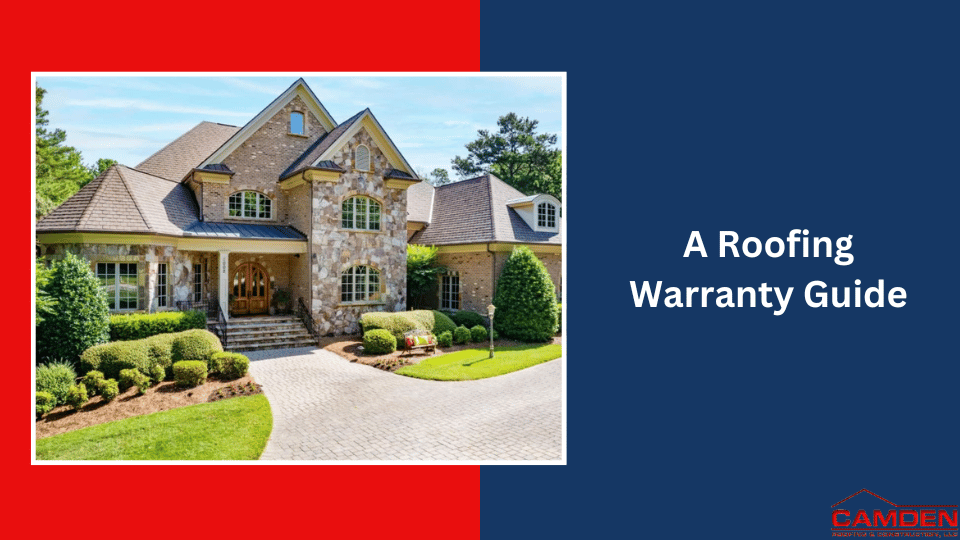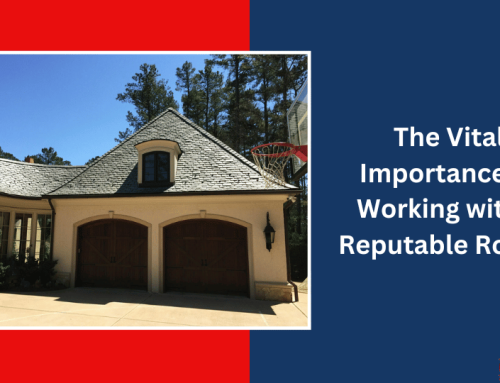A Roofing Warranty Guide from Camden Roofing & Construction. When investing in a new roof, homeowners often rely on warranties to provide peace of mind and assurance of quality craftsmanship and materials. However, navigating the complexities of roof warranties can be daunting, with various terms, coverage options, and limitations to consider. Understanding the different types of warranties, what they cover, and how to assess their value is essential for homeowners to make informed decisions and protect their roofing investment. In this comprehensive guide, we’ll demystify roof warranties, providing homeowners with the knowledge and tools they need to navigate warranty options confidently.

Types of Roof Warranties:
Manufacturer’s Warranty: This type of warranty, also known as a material warranty, is provided by the roofing material manufacturer and covers defects in materials, such as manufacturing defects, premature deterioration, or failure to perform as intended. Manufacturer warranties typically have varying coverage periods and may include prorated or non-prorated coverage.
Workmanship Warranty: A workmanship warranty, also known as an installation warranty or contractor warranty, is offered by the roofing contractor and covers defects in workmanship, such as improper installation, faulty repairs, or errors in construction. Workmanship warranties typically range from one to ten years and provide assurance that the contractor will correct any installation-related issues at no additional cost to the homeowner.
Extended Warranty: Some roofing manufacturers offer extended warranties, also known as system warranties or comprehensive warranties, that combine coverage for both materials and workmanship. These warranties may extend coverage beyond the standard warranty period and provide additional protection against a wider range of issues, such as wind damage, algae resistance, or hail damage.
Understanding Warranty Coverage:
Materials Coverage: Manufacturer warranties typically cover defects in roofing materials, such as shingle delamination, granule loss, or premature deterioration. Coverage may vary depending on the type and grade of materials used, with higher-quality products often offering longer warranty periods and more extensive coverage.
Workmanship Coverage: Workmanship warranties cover errors or defects in the installation process, such as improper flashing, inadequate ventilation, or faulty sealing. These warranties ensure that the contractor will correct any installation-related issues that arise during the warranty period, typically at no cost to the homeowner.
Exclusions and Limitations: It’s important to carefully review the terms and conditions of the warranty to understand any exclusions, limitations, or conditions that may affect coverage. Common exclusions may include acts of nature, improper maintenance, use of incompatible accessories or modifications, or damage caused by third parties.
Evaluating Warranty Duration and Terms:
Coverage Period: The duration of the warranty, also known as the warranty period, varies depending on the type of warranty and the manufacturer’s terms. Manufacturer warranties may range from 10 to 50 years or more, while workmanship warranties typically range from one to ten years. Extended warranties may offer coverage for up to 50 years or the lifetime of the roof.
Prorated vs. Non-Prorated: Manufacturer warranties may be prorated or non-prorated, affecting the amount of coverage provided over time. Prorated warranties reduce coverage and reimbursement amounts based on the age of the roof, while non-prorated warranties offer full coverage throughout the warranty period.
Transferability: Consider whether the warranty is transferable if you sell your home before the warranty expires. Transferable warranties can enhance the resale value of your home and provide added assurance to potential buyers.
Maintenance Requirements and Responsibilities:
Regular Inspections: Many warranties require homeowners to conduct regular inspections and maintenance to maintain coverage. Inspections may include checking for damage, debris buildup, or signs of wear and tear and addressing any issues promptly.
Proper Ventilation: Adequate roof ventilation is often a requirement for warranty coverage, as improper ventilation can lead to moisture buildup, attic condensation, and premature roof failure. Ensure that your roof has proper ventilation according to manufacturer guidelines.
Documentation and Records: Keep detailed records of all maintenance activities, inspections, and repairs related to your roof. Proper documentation can help support warranty claims and ensure that you fulfill your responsibilities as outlined in the warranty agreement.
Making Warranty Claims and Resolving Disputes:
Contact the Manufacturer or Contractor: If you encounter issues covered by the warranty, such as defects in materials or workmanship, contact the manufacturer or roofing contractor to initiate the claims process. Provide documentation, photographs, and evidence to support your claim.
Follow Procedures: Follow the procedures outlined in the warranty agreement for submitting claims and resolving disputes. Be prepared to provide proof of purchase, installation, and maintenance records as requested by the manufacturer or contractor.
Seek Legal Assistance: If disputes arise regarding warranty coverage or claim resolution, consider seeking legal assistance from a qualified attorney specializing in construction law or consumer protection. An attorney can help you understand your rights, negotiate with the manufacturer or contractor, and pursue legal recourse if necessary.
Supplemental Warranty Options:
Roofing Contractor Guarantees: Some roofing contractors offer additional guarantees or assurances beyond manufacturer warranties to provide added peace of mind. These guarantees may include satisfaction guarantees, workmanship guarantees, or promises of ongoing support and service.
Extended Service Plans: Consider purchasing extended service plans or maintenance contracts from reputable roofing contractors to supplement manufacturer warranties. These plans may offer scheduled inspections, preventive maintenance, and priority service for repairs or replacements.
Conclusion:
Roof warranties play a crucial role in protecting homeowners from unexpected expenses and ensuring the long-term performance and durability of their roofs. By understanding the different types of warranties, coverage options, terms, and responsibilities, homeowners can make informed decisions and confidently navigate the warranty process. Whether you’re purchasing a new roof or seeking coverage for an existing roof, carefully review warranty agreements, maintain proper documentation, and follow best practices for maintenance and claims resolution to maximize the value and effectiveness of your warranty coverage. With the right knowledge and proactive approach, you can enjoy peace of mind knowing that your roof is backed by comprehensive and reliable warranty protection.
For more information, contact Camden Roofing & Construction, LLC in Charlotte and Raleigh, NC, at 919-729-5050.

